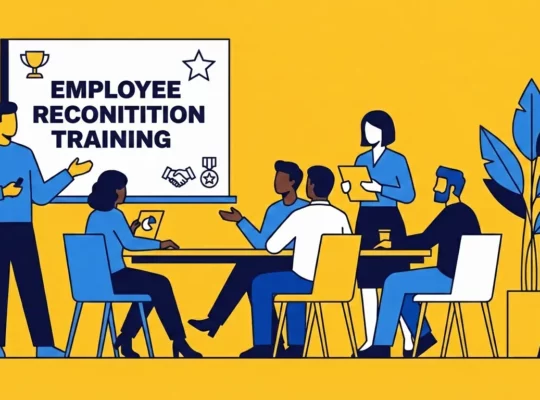Attracting and retaining top talent feels like chasing a phantom – you know they exist, but pinning them down seems impossible. At Review.jobs, we understand your struggle. We see companies of all sizes facing the same challenge: a sea of resumes, a constant battle for attention, and the frustration of not finding the perfect fit. But what if there was a way to attract the right talent, not just any talent? What if you could build a reputation as a company where people truly want to work? This is where a strong talent brand comes in. It’s your secret weapon for standing out in the crowd and attracting the best and brightest.
Table of Contents
I. What is a talent brand?
II. Employer brand vs. talent brand
III. Importance of Establishing a Talent Brand in the Modern Workforce
IV. Pillars of a Strong Talent Brand
V. Benefits of a Strong Talent Brand
VI. Pitfalls of Maintaining a Talent Brand
I. What is a Talent Brand?
A talent brand is the image your organization projects as an employer. It encompasses how current employees experience working there, and how potential hires perceive your company culture and work environment. It encapsulates the essence of your company’s reputation in the job market, focusing specifically on the narrative that your company crafts about the employee experience. This branding influences not just the recruitment process but the overall engagement and satisfaction of employees. Effective talent branding conveys a company’s mission, values, and culture, making it a fundamental aspect of the branding strategy.
II. Employer Brand vs. Talent Brand
| Aspect | Employer Brand | Talent Brand |
| Definition | The overall value proposition a company offers to all stakeholders, including shareholders, customers, and employees. | Focuses on the company’s reputation and attractiveness from the perspective of current and prospective employees. |
| Scope | Broad, encompassing all aspects of the company’s image and value proposition. | Narrow, specifically targeting the employee experience and public perception of the workplace. |
| Primary Audience | Shareholders, customers, employees, and the general public. | Current employees, prospective employees, and the talent market. |
| Influence Factors | Company messaging, corporate communications, and overall business practices. | Company messaging, employee experiences, public reviews, and shared workforce experiences. |
| Purpose | Builds general corporate credibility and trust among all stakeholders. | Attracts and retains top talent by showcasing a positive and dynamic work environment. |
| Dynamics | Relatively static, focused on long-term value propositions. | More dynamic, influenced by real-time employee feedback and experiences. |
| Impact | Enhances overall corporate reputation and stakeholder trust. | Directly impacts talent acquisition and retention, shaping the workforce quality. |
III. Importance of Establishing a Talent Brand in the Modern Workforce
The significance of establishing a robust talent brand cannot be understated, particularly as it becomes a pivotal factor in talent acquisition and retention strategies. A well-defined talent brand ensures that your organization attracts the right kind of early talent and experienced professionals who align with your corporate ethos. It also:
- Enhances your ability to reach top candidates before your competitors do, giving you an edge in sourcing the best talent.
- Boosts retention by aligning the employee proposition with the actual working conditions and career development opportunities provided.
- Cultivates a sense of belonging and loyalty, transforming employees into brand ambassadors who positively reflect on your company’s reputation.
- Facilitates an employer brand that inspires authenticity, making your company a great place to work.
IV. The 3 Pillars of a Strong Talent Brand
The strength of a talent brand lies in several foundational pillars that collectively shape how the brand is perceived internally and externally. These pillars are crucial for aligning the organization’s goals with the expectations of its workforce, thereby enhancing the overall branding strategy.
A. Company culture and values
A vibrant, positive company culture supports a work environment that empowers employees, fosters innovation, and drives engagement. The company’s core values should be clear and communicated consistently, acting as guiding principles that inform every aspect of the organization’s operations and interactions. Whether it’s integrity, creativity, or collaboration, these values must resonate through every level of the company, ensuring that they are not just words on a website but practices lived out daily by every team member.
B. Employee value proposition (EVP)
The Employee Value Proposition (EVP) is a critical component of your talent brand. It defines the benefits, compensations, and development opportunities offered to employees in exchange for their skills, capabilities, and valuable experiences. It should articulate not only the tangible benefits like salary and health insurance but also intangible aspects such as career growth opportunities, recognition, and work-life balance.
Research shows an unattractive EVP can lead to a staggering 65% drop-out rate during application! Aligning your EVP with your employees’ values further boosts retention, creating a win-win for both attracting and keeping top talent.
C. Consistency in messaging across all platforms
Building a strong talent brand requires a unified voice. Consistent messaging across all channels, from job postings to social media, is the glue that binds it all together. This builds trust by delivering the same core message about your company culture, values, and what it’s like to work there. Think of it like a lighthouse, shining a beacon of clarity that ensures everyone receives the same core message and forms a unified perception of what it’s like to work at your organization.
V. Benefits of Establishing a Strong Talent Brand
A robust talent brand offers significant advantages to organizations, impacting everything from recruitment to reputation. These benefits are the essence of the long-term health and success of your business.
A. Attracting the Best Talent
When your company is known for a positive employee experience and a strong commitment to company culture, it naturally draws interest from high-caliber candidates. These individuals are looking not just for a job, but for a place where they can align their career goals with the values and opportunities provided by the employer.
B. Saving up on Hiring Costs
A well-established talent brand can significantly reduce hiring costs. Organizations with a strong talent brand experience up to a 50% cost-per-hire reduction. Companies with excellent reputations spend less on recruitment advertising and often incur fewer expenses in negotiating employment terms with prospective hires, as their value propositions are already well-recognized and attractive.
C. Engaging Your Employees and Retaining Your Workforce
A strong talent brand fosters a deep sense of engagement among employees by aligning the company’s values with their personal and professional goals. This alignment helps reduce turnover rates and increases loyalty, as employees feel more connected and satisfied with their workplace. This helps retain skilled staff and transform them into brand ambassadors who share their positive experiences through employee review platforms such as Review.jobs.
D. Revamping Your Company Reputation
Investing in a strong talent brand helps revamp and uphold a positive public image, which is critical for attracting and maintaining customer trust as well as employee satisfaction. As an employer, take example from top brands and check out brand reputation management case studies.
VI. Pitfalls of Maintaining a Talent Brand
While the benefits of cultivating a strong talent brand are clear, several challenges can impede its effectiveness.
A. Navigating Negative Feedback
Whether it comes from current or former employees, negative feedback can pose a significant challenge to maintaining a positive talent brand. Organizations need to address such feedback proactively and transparently. This approach not only mitigates the impact of negative feedback but also strengthens the talent brand by showing that the company values honesty and is committed to employee satisfaction. Companies should establish clear feedback channels to demonstrate a commitment to continuous improvement by openly addressing concerns and making necessary changes.
B. Adapting to Changing Workforce Expectations
What was considered an attractive employer brand a decade ago may not hold the same appeal today. For instance, the increasing desire for work-life balance, remote work opportunities, and meaningful work are trends that companies must integrate into their employee proposition. Failing to adapt to these changing expectations can make an organization seem out of touch, making it harder to attract and retain top talent. Regularly revisiting and updating the EVP to reflect these changes is crucial for keeping the talent brand relevant and appealing.
C. Ensuring Consistency Across Global Markets
For organizations operating in multiple countries, maintaining consistency in the talent brand across diverse markets presents a formidable challenge. Different cultural, legal, and market dynamics can necessitate adjustments in how the brand is presented and perceived. However, the core elements of the talent brand—such as company culture and values—should remain consistent, providing a unified brand experience. Companies need to tailor their approaches to meet local needs while ensuring that these adaptations do not dilute the overall brand message.
As we’ve explored, the benefits of a well-crafted talent brand are vast, ranging from attracting top talent to enhancing your overall business reputation. Review.jobs encourages all companies to invest deeply in talent branding efforts, starting from providing their employees with a platform to voice their honest, anonymous opinions. As the landscape of talent management continues to evolve, staying responsive to these changes and proactive in your strategies will ensure your employer image remains compelling. Let your commitment to a dynamic talent brand be your guide in the relentless pursuit of excellence and innovation.





